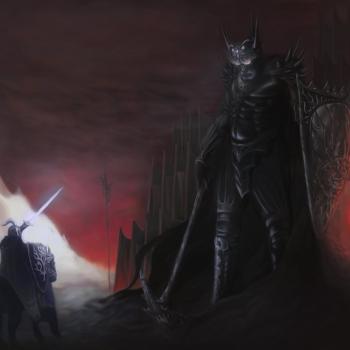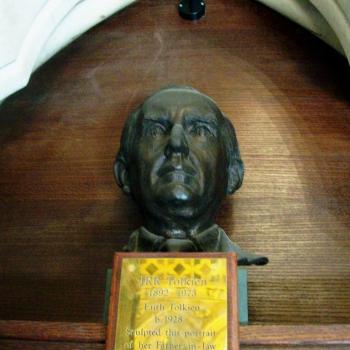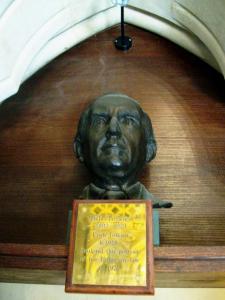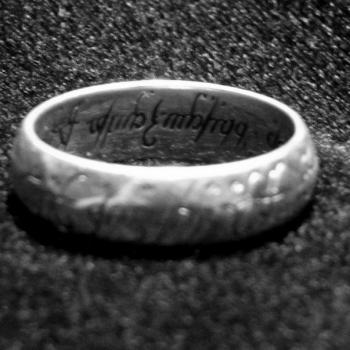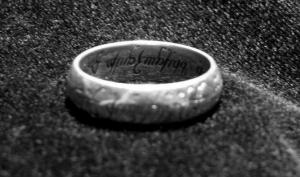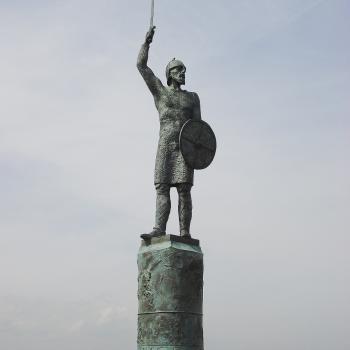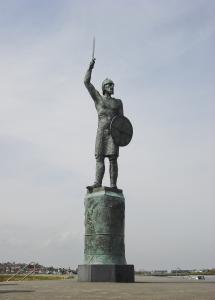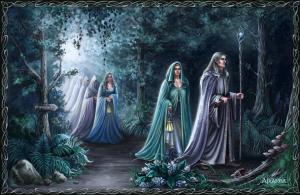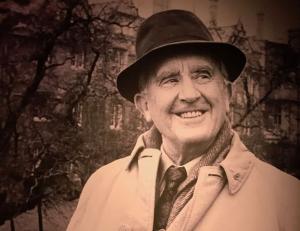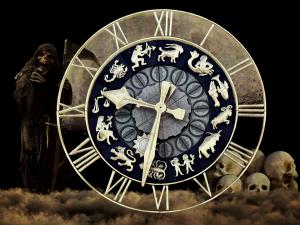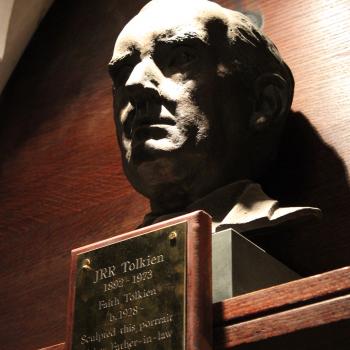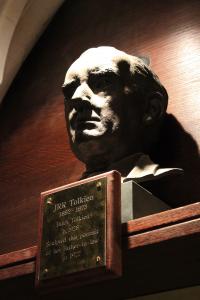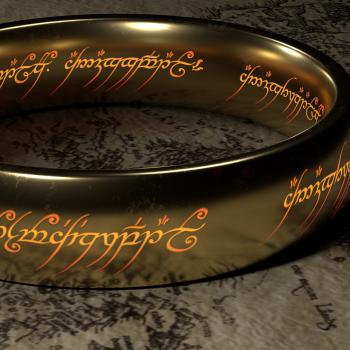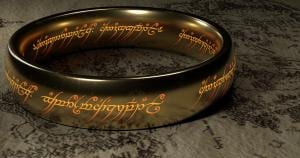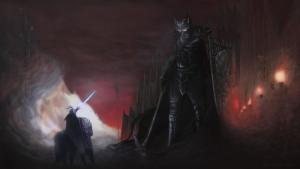
One of the key elements which connects J.R.R. Tolkien’s personal faith with his myths is his understanding of angels and their role in world history. He believed, like many other Christians, that angels had a more direct interaction with humanity in pre-Christian times than they did after the incarnation. For, after God became human, the role angels had changed to reflect the more direct relationship humanity would have with God. As his myth took place in pre-history, long before the incarnation, God had far less direct interaction with humanity. It was the time when God’s angels, the Valar and their servants, were given the most freedom to interact with and direct world history:
The cycles begin with a cosmogonical myth: the Music of the Ainur. God and the Valar (or powers: Englished as gods) are revealed. These latter are as we should say angelic powers, whose function is to exercise delegated authority in their spheres (of rule and government, not creation, making or re-making). They are ‘divine’, that is, were originally ‘outside’ and existed ‘before’ the making of the world. Their power and wisdom is derived from their Knowledge of the cosmogonical drama, which they perceived first as a drama (that is as in a fashion we perceive a story composed by some-one else), and later as a ‘reality’. On the side of mere narrative device, this is, of course, meant to provide beings of the same order of beauty, power, and majesty as the ‘gods’ of higher mythology, which can yet be accepted – well, shall we say baldly, by a mind that believes in the Blessed Trinity.[1]
Tolkien could have pointed to ancient Christian writers like St. Augustine, showing how they also said that Christians and Platonists (among others) were talking about the same thing when they mentioned either angels or the gods.[2] Augustine wasn’t interested in a debate over terms; Christians and Platonists agreed that there was the One (God) over and above all the others, indeed One from which the angels (or other “gods”) came to be. Christians certainly could see that the role angels had in pre-Christian history, with the power and authority given to them, could easily be misconstrued, turning them into gods. This is especially true in the way many of the angels were said to have particular domains for their power and authority, similar to the way pagans mapped out their own pantheons. We can see this kind of understanding of Origen in the writings of Origen, who, influenced also by the Jewish tradition, explained how various angelic powers ruled over a particular territory of creation, sometimes being that of a particular element:
But someone might say that, if the sea and each of the rivers were animate, it would entail a long logos to seek how it is that they are animate; nonetheless, all have been assigned to a holy power. And here are angels put in charge of managing marine affairs and other angels to manage the affairs of this or that river, so there are also angels to manage the air, and when more divine angels manage the affairs of the air, then the air does not sicken or become noxious. [3]
Tolkien engaged this notion, and brought with it, other early Christian sentiments, such as the reason why the Mosaic Covenant forbade the use of images is because the incarnation had not yet taken place, and so there was no legitimate way for God to be represented by a material form. He took these assumptions further and considered the kinds of implications they would have had in the far distant past, further before the incarnation, when there was even less direct interaction between God and creation; this led him to think that temples, would have had similar negative connotations in the far distant past. This is why they were often banned and those who constructed them did so for an evil purpose.[4] This explains the situation he developed for Númenor :
The Númenóreans thus began a great new good, and as monotheists; but like the Jews (only more so) with only one physical centre of ‘worship’: the summit of the mountain Meneltarma ‘Pillar of Heaven’ – literally, for they did not conceive of the sky as a divine residence – in the centre of Númenor; but it had no building and no temple, as all such things had evil associations. But they ‘fell’ again – because of a Ban or prohibition, inevitably. They were forbidden to sail west beyond their own land because they were not allowed to be or try to be ‘immortal’; and in this myth the Blessed Realm is represented as still having an actual physical existence as a region of the real world, one which they could have reached by ship, being very great mariners. While obedient, people from the Blessed Realm often visited them, and so their knowledge and arts reached almost an Elvish height.[5]
If some angelic power became too attached to the world, and the power they had over the world, they risked falling away from God, becoming, that is, a fallen angel (that is, a evil daemon or god). This could be seen in the way Morgoth, and later Sauron, tried to “incarnate” themselves: they wanted to take control over the world by infusing themselves into it, contaminating it in the process, so that all those who were of the world would be influenced (if not controlled) by them. A temple in this era would have been the sign of such a desire for domination and control, a desire which ultimately would become the source for Morgoth and Sauron’s downfall, for they would distil their power into the world, so if that power were broken or destroyed, they would lose the power and control they possessed over others (as can be seen with the destruction of Sauron’s ring). Thus, in the world where angelic beings had more direct contact with humanity (and other races), Tolkien believed that those powers could and often would work for the good of the world, but he also saw the temptation many of them would face, for they would believe the world must be molded to their particular notion of what is good and so accumulate power in order to force the world to conform to their will instead of the greater will of God (Eru). This can be seen as being quite similar to the way early Christians understood the pre-Christian world, where daemonic powers, fallen angels, who gave into such a temptation, still held sway over the domain they had been given before their fall.
After Christ, after the incarnation, the world changed; the place of the “gods” had changed. Those who remained faithful and pure still have an important role in the kingdom of God, but those which had fallen found God’s intervention in world history slowly working to remove their power and influence over the world, making them as if they were dead (exemplified by the way apologists would talk about how Plutarch revealed that “the Great Pan is dead.”) Angels now found their primary service was to help point humanity away from themselves and to God; this meant they could and would still help reveal qualities about God, but their purpose was then to recede, similar to the way John the Baptist did after Christ’s baptism. Tolkien expressed this to his son, Christopher, after telling Christopher about an encounter with what be believed was an angelic presence while engaging eucharistic adoration:
And the ray was the Guardian Angel of the mote: not a thing interposed between God and the creature, but God’s very attention itself, personalized. And I do not mean ‘personified’, by a mere figure of speech according to the tendencies of human language, but a real (finite) person. Thinking of it since – for the whole thing was very immediate, and not recapturable in clumsy language, certainly not the great sense of joy that accompanied it and the realization that the shining poised mote was myself (or any other human person that I might think of with love) – it has occurred to me that (I speak diffidently and have no idea whether such a notion is legitimate: it is at any rate quite separate from the vision of the Light and the poised mote) this is a finite parallel to the Infinite. As the love of the Father and Son (who are infinite and equal) is a Person, so the love and attention of the Light to the Mote is a person (that is both with us and in Heaven): finite but divine: i.e. angelic.[6]
Thus, in another letter, Tolkien also told Christopher to keep his guardian angel in mind, reflecting, once again, the relationship between the angel and God, and how the angel hopefully will serve as a source of comfort and peace:
Remember your guardian angel. Not a plump lady with swan-wings! But – at least this is my notion and feeling – : as souls with free-will we are, as it were, so placed as to face (or to be able to face) God. But God is (so to speak) also behind us, supporting, nourishing us (as being creatures). The bright point of power where that life-line, that spiritual umbilical cord touches: there is our Angel, facing two ways to God behind us in the direction we cannot see, and to us. But of course do not grow weary of facing God, in your free right and strength (both provided ‘from behind’ as I say). If you cannot achieve inward peace, and it is given to few to do so (least of all to me) in tribulation, do not forget that the aspiration for it is not a vanity, but a concrete act. I am sorry to talk like this, and so haltingly. But I can do no more for you dearest. …[7]
Tolkien indicated, in these passages, that he believed that angels somehow participate in the divine life; this allowed them to serve as a face which we can turn to when we need to engage God. This is not because we cannot have direct access to God, as we can, but we still want and need something to apprehend which is more relatable than the transcendent divine nature itself. Because they are given this kind of participation in the divine life, this gives us another reason why it is fine to call them “gods.” They are “gods” similar to the way we can become “gods,” that is, not by nature, but by grace. Each angel then can serve to represent one of more uncreated energies (and thus qualities) of God, those energies which they have engaged or “assimilated” into their own being..
With this understanding of angels, we can better appreciate the way Tolkien presents angelic beings as gods, and even how they can be tempted and fall. Each of them participated in some elements of the divine life, giving them experience of various uncreated energies of God, energies which gave them power and authority similar to the way God’s energies themselves have power and authority over the whole of creation. They were free to engage that gift with love, and in doing so, share what they have been given with the rest of the world, coordinating their own actions to affirm God and God’s greater glory, or else, they could take what they have been given, and try to use it for personal gain at the expense of others (including the world), glorifying themselves in the process (and so fall from grace, as can be seen in the way Tolkien described the fall of Morgoth). And, in the pre-incarnate era of history, Tolkien thought that those beings which did not fall, those which took what was given to them and continued to embrace God with faithful love, would have had all kinds of powers and control associated with those elements or qualities of the divine life they had, powers which then let them be viewed as gods by those who were not so close to God. After the incarnation, such powers, such angelic beings, still exist and thrive, and still served humanity and the rest of creation, but humanity now can have its direct connection with God, which is why they no longer needed angelic beings to serve them as tutors; instead, they became friends and fellow lovers of God sharing with each other the blessings they have received as exemplified by the Song of Songs, where they can be said to be the friends of the Bridegroom.
[1] J.R.R. Tolkien, The Letters of J.R.R. Tolkien. Revised and Expanded Edition. Ed. Humphrey Carpenter and Christopher Tolkien (Broadway, NY: William Morrow, 2023), 205-6 [Letter 131 to Milton Waldman].
[2] See St. Augustine, City of God in NPNF1(2): 178 [IX.23].
[3] Origen, Homilies on the Psalms: Codex Monacensis Graecus 314. Trans. Joseph W. Trigg (Washington, DC: CUA Press, 2020), 268 [Homily 3 on Psalm 76].
[4] See J.R.R. Tolkien, “The Rivers and Beacon-Hills of Gondor,” in The Nature of Middle Earth. Ed. Carl F. Hostetter (Boston: Houghton Mifflin, 2021), 392-3.
[5] J.R.R. Tolkien, The Letters of J.R.R. Tolkien. Revised and Expanded Edition, 301 [Letter 156 to Robert Murray, SR].
[6] J.R.R. Tolkien, The Letters of J.R.R. Tolkien. Revised and Expanded Edition, 141 [Letter 89 to Christopher Tolkien].
[7] J.R.R. Tolkien, The Letters of J.R.R. Tolkien. Revised and Expanded Edition, 94-5 [Letter 54 to Christopher Tolkien].
Stay in touch! Like A Little Bit of Nothing on Facebook.
If you liked what you read, please consider sharing it with your friends and family!
N.B.: While I read comments to moderate them, I rarely respond to them. If I don’t respond to your comment directly, don’t assume I am unthankful for it. I appreciate it. But I want readers to feel free to ask questions, and hopefully, dialogue with each other. I have shared what I wanted to say, though some responses will get a brief reply by me, or, if I find it interesting and something I can engage fully, as the foundation for another post. I have had many posts inspired or improved upon thanks to my readers.


